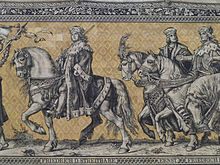You can help expand this article with text translated from the corresponding article in German. (September 2012) Click for important translation instructions.
|
| This article needs additional citations for verification. Please help improve this article by adding citations to reliable sources. Unsourced material may be challenged and removed. Find sources: "Ernest, Elector of Saxony" – news · newspapers · books · scholar · JSTOR (April 2017) (Learn how and when to remove this message) |
| Ernest | |
|---|---|
 Portrait by Lucas Cranach the Younger Portrait by Lucas Cranach the Younger | |
| Elector of Saxony | |
| Reign | 7 September 1464 – 26 August 1486 |
| Predecessor | Frederick II |
| Successor | Frederick III |
| Landgrave of Thuringia | |
| Reign | 17 September 1482 – 26 August 1486 |
| Predecessor | William II |
| Successor | Frederick VI |
| Born | 24 March 1441 Meissen, Margravate of Meissen, Electorate of Saxony, Holy Roman Empire |
| Died | 26 August 1486(1486-08-26) (aged 45) Colditz Castle, Margravate of Meissen, Electorate of Saxony, Holy Roman Empire |
| Burial | Meissen Cathedral |
| Spouse |
Elisabeth of Bavaria-Munich
(m. 1460; died 1484) |
| Issue among others... | Christina, Queen of Denmark Frederick III, Elector of Saxony Johann, Elector of Saxony Margarete, Duchess of Brunswick-Lüneburg |
| House | House of Wettin |
| Father | Frederick II, Elector of Saxony |
| Mother | Margaret of Austria-Styria |
Ernest (24 March 1441 – 26 August 1486), known as Ernst in German, was Elector of Saxony from 1464 to 1486.
Ernst was the founder and progenitor of the Ernestine line of Saxon princes.
Biography

Ernst was born in Meissen, the second son (but fourth in order of birth) of the eight children of Frederick II, Elector of Saxony and Margaret of Austria, sister of Frederick III, Holy Roman Emperor. The death of his older brother Frederick (1451) made him the new heir apparent to the position of Elector of Saxony.
In 1455 Ernst was briefly kidnapped, along with his brother Albert, by the knight Kunz von Kaufungen an episode famous in German history as the Prinzenraub (i.e. The Stealing of the Princes).
In 1464, he succeeded his father as Elector of Saxony, and annexed Thuringia in 1482, and three years later (Treaty of Leipzig, 1485) shared his territory with his brother Albert, until he arranged the division of the common possession.
According to the Treaty of Leipzig he received an area around Wittenberg, the southern Thuringian part, the Vogtland and parts of the Pleissnerland. As a residence he selected Wittenberg. He provided for the welfare of the country and introduced the constitution.
One year after the division, Ernest died in Colditz, at the age of 46 years, the consequence of a fall from a horse.
Children

In Leipzig on 19 November 1460 Ernst married Elisabeth of Bavaria. They had seven children:
- Christina (25 December 1461, Torgau – 8 December 1521, Odense), married on 6 September 1478 to King John I of Denmark
- Frederick III, Elector of Saxony (17 January 1463, Torgau – 5 May 1525, Lockau)
- Ernest (26 June 1464, Meissen – 3 August 1513, Halle), Archbishop of Magdeburg (1476–1480), Bishop of Halberstadt (1480–1513)
- Adalbert (8 May 1467, Meissen – 1 May 1484, Aschaffenburg), Administrator of Mainz
- Johann, Elector of Saxony (30 June 1468, Meissen – 16 August 1532, Schweinitz)
- Margarete (4 August 1469, Meissen – 7 December 1528, Weimar), married on 27 February 1487 to Henry I of Lüneburg
- Wolfgang (c. 1473, Meissen – c. 1478, Torgau).
Ancestry
| Ancestors of Ernest, Elector of Saxony | |||||||||||||||||||||||||||||||||||||||||||||||||||||||||||||||||||||||||||||||||||||||||||||||||||||||||||||||||||||||||||||||||||||||||||||||||||||||||||||||||||||||||||||||||||||||||||||||||||||||||||||||||||||||||||||||||||||||||||||||||||||||||||||||||||||||||||||||||||||||||
|---|---|---|---|---|---|---|---|---|---|---|---|---|---|---|---|---|---|---|---|---|---|---|---|---|---|---|---|---|---|---|---|---|---|---|---|---|---|---|---|---|---|---|---|---|---|---|---|---|---|---|---|---|---|---|---|---|---|---|---|---|---|---|---|---|---|---|---|---|---|---|---|---|---|---|---|---|---|---|---|---|---|---|---|---|---|---|---|---|---|---|---|---|---|---|---|---|---|---|---|---|---|---|---|---|---|---|---|---|---|---|---|---|---|---|---|---|---|---|---|---|---|---|---|---|---|---|---|---|---|---|---|---|---|---|---|---|---|---|---|---|---|---|---|---|---|---|---|---|---|---|---|---|---|---|---|---|---|---|---|---|---|---|---|---|---|---|---|---|---|---|---|---|---|---|---|---|---|---|---|---|---|---|---|---|---|---|---|---|---|---|---|---|---|---|---|---|---|---|---|---|---|---|---|---|---|---|---|---|---|---|---|---|---|---|---|---|---|---|---|---|---|---|---|---|---|---|---|---|---|---|---|---|---|---|---|---|---|---|---|---|---|---|---|---|---|---|---|---|---|---|---|---|---|---|---|---|---|---|---|---|---|---|---|---|---|---|---|---|---|---|---|---|---|---|---|---|---|---|---|---|---|
| |||||||||||||||||||||||||||||||||||||||||||||||||||||||||||||||||||||||||||||||||||||||||||||||||||||||||||||||||||||||||||||||||||||||||||||||||||||||||||||||||||||||||||||||||||||||||||||||||||||||||||||||||||||||||||||||||||||||||||||||||||||||||||||||||||||||||||||||||||||||||
References
- Trim 2003, p. 214.
- Chisholm, Hugh, ed. (1911). "Frederick II., Elector of Saxony" . Encyclopædia Britannica. Vol. 11 (11th ed.). Cambridge University Press. p. 60.
Sources
- Trim, David J. B. (2003). The Chivalric Ethos and the Development of Military Professionalism. BRILL. ISBN 978-9004120952.
| Ernest, Elector of Saxony House of WettinBorn: 24 March 144126 August | ||
| Preceded byFrederick II | Elector of Saxony 1464–1486 |
Succeeded byFrederick III |
| Preceded byWilliam II | Landgrave of Thuringia 1482–1486 |
Succeeded byFrederick VI |
| Princes of Saxony | |
|---|---|
| The generations are numbered from the ascension of Frederick I as Elector of Saxony in 1423. | |
| 1st generation | |
| 2nd generation | |
| 3rd generation | |
| 4th generation | |
| 5th generation | |
| 6th generation | |
| 7th generation | |
| 8th generation | |
| 9th generation | |
| 10th generation | |
| 11th generation | |
| 12th generation | |
| 13th generation | |
| 14th generation | |
| 15th generation | |
| 16th generation | |
| 17th generation | |
| 18th generation | |
| 19th generation | |
| also królewicz of Poland and Lithuania | |